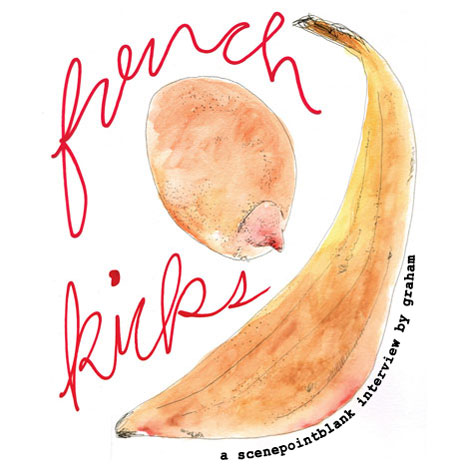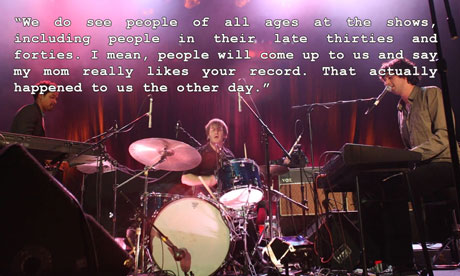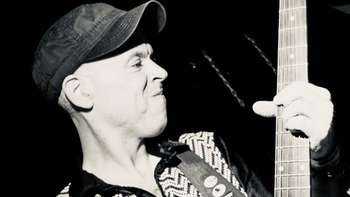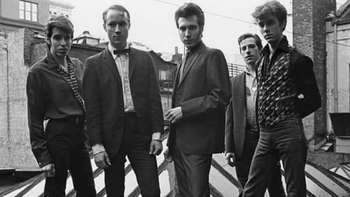A month or so ago now, I received a telephone call from my friend Laura. She had been asked by Vagrant Records to do an interview with French Kicks. But because of her fairly severe problem with procrastination, she had neglected to get together any questions. Now, eight hours before the interview was suppose to happen, she informs me that rather than canceling I was going with her for moral support. Fine, okay, I could do that. We small talk for a little while longer; catching up on how school's been, what's been up between mutual friends, and what not. Then, just before hanging up she goes " Oh, and about tonightâ?¦by moral support I meant you're going to be asking all the questions. Have fun." Click.

Aside from a couple of songs I had heard on a friend's computer, and that the band had been grouped with the " the" band sound of a few years back, I knew next to nothing about French Kicks. An afternoon of too much coffee, downloading, and research, however, lead me to some interesting conclusions. First; Though often dubbed with the trite "New York sound" label, the twenty-somethings originally from the Washington area don't have a lot in common with their supposed counterparts. While it's almost a given that any band nowadays are going to cite some sort of 80's new wave group as influences, it's rare that we ever hear it picked up in the music. As a reference point, it's a fair comparison to say that French Kicks do have some roots in that, but that's just a start. They're creating something both introspective and danceable, which is a rare commodity. Second; In July the band released a record called Two Thousand, which has a slightly more gown up feel then their previous work, and ever since have been touring in support of that record. Third: Nick Stumpf, the lead singer, used to play drums in the band and is brothers with the bassist Lawrence. And lastly, and maybe most important to my own effort: French Kicks, through no fault of their own, have done a lot of really poor interviews. It seems that people just don't know what to ask them, which made my task at hand a lot easier.
Armed with this newfound knowledge I proceeded to the venue to sit down with Laura, whom I might add was snickering while I walked in, Katie the publicist, and Nick Stumpf. Over a about a pint and a half, here is what unfolded:
Scene Point Blank: The title of the new album is Two Thousand. I had read in an interview you did earlier this year that this was in reference to the millennium mark. How everyone was expecting something gigantic to happen, and the after effect was rather anticlimactic. In terms of that being a label for the album, how does it establish tone?
Nick Stumpf: Well, I mean, there is an element to it that talking about the millennium is a joke we only get in hindsight. To have anything that refers to the millennium as if it might be relevant in 2006 just seemsâ?¦well you know. Who cares about Y2K now? It's trying to capture that idea of something that everyone was all worked up about and that didn't necessarily turn into anything. Nothing really happened, and we deal with that aftermath or lack there of. If you encountered anyone excited about the year 2000 or trying to warn you about it now, you'd probably be like " What the hell are you talking about? Why are you talking about that?" But I mean the record is not about the millennium. (laughs) What it deals with is the idea of being worried about something that is not ultimately a big deal, as well as being out of touch with the things around you.
Scene Point Blank: Your writing on this album takes more of a personal, as well as tongue and cheek, approach than the last one. As the tracks are dealing with you getting worked up or frustrated with the things around, how does the rest of the band deal with putting your emotions on stage? Is that ever an issue?
Nick Stumpf: If it's an issue I don't hear about it. I don't know. It's Josh and I who do all the songs; I write all the lyrics, except he sings one song and he writes all his own. I guess if they didn't dig it, they wouldn't do it. I think they like the music, because it's fun music to play. I have no idea what's there take on the emotional element if they have one and all, and I wouldn't be surprised if they didn't have one.
Scene Point Blank: On the other side of that; from a songwriter's perspective in having to expose your thoughts and what not, is there ever a point where you're not comfortable sharing this with the rest of the band, or sharing this with the people who will eventually listen?
Nick Stumpf: Oh yeah, of course. I'm an extremely private person; I don't do the exhibitionist sort of thing well at all. I have to work on stuff very privately. When I do lyrics, I write them and when we go to record the record I can't stand other people in the room during the whole thing. It's my own for a while and it becomes everyone's after it's done. That's something you have to get used to.
Scene Point Blank: You mentioned Josh earlier. He has done all the artwork and recent t-shirt designs for you guys, does that ever become a point of contention?
Nick Stumpf: No. Quite the contrary actually. We've been encouraging him to do it for years and recently he just really dove into it. I love the stuff that he does. It's really hard to find artwork period, but to find someone who can express us specifically in ways we know are going to make sense, and who also happens to be in the band, is just amazing.
Laura: From what I've seen, your live shows feed mainly off charisma and feedback with the crowd around you, has there been any audience responses where you felt like they weren't giving you anything to work with?
Nick Stumpf: Well there's always something to work with (laughs) but I guess the tour we had recently with The Get Up Kids was the only time we really had any hecklers.
Laura: Really?
Nick Stumpf: I mean not many, it was fine. But generally I think our band fits well into most crowds. With most people we've been in front of it's been okay; they've dug it and it's been cool, or they've ignored it and that's fine. There is a certain element we don't necessarily translate too, which is pretty much like Vagrant bands to tell you the truth. (Looks to publicist Katie sitting across the table and laughs) I'm not knocking Vagrant bands or anything, I'm just saying in that world we don't go over very well.
Katie: It's a hard world to get into; some bands can be very elitist.
Nick Stumpf: We're all bands, but we don't do great in that setting, we do okay everywhere else.
Katie: But you have that slight crossover, and sometimes that works, sometimes it doesn't.
Scene Point Blank: Is it the scenesters kids who you've had a hard time with?
Nick Stumpf: No, no. It's the manly men who don't seem to want to get it.
Katie: With the side hair?
Nick Stumpf: No, like the guys with the military hat and big muscles; like the Helmet type guys.
Katie: Like the meathead type guys?
Nick Stumpf: No, like the Helmet fans. You know the band Helmet?
Katie: No.
Nick Stumpf: Well we played this show with them, and it was really one of only times when the crowd has just hated us. Of course when you're in a band some people are going to be like " Fuck you," and others are going to be like "That was good, you guys are really great," and others will be like "Who were you again?," but this crowd is the only one I can recall that gave off a hostile vibe.
Katie: Hostile?
Laura: Were bottles being thrown or something?
Nick Stumpf: It was just the vibe. That type of crowd was like really masculine guys wearing black shirts with nothing on them, really ripped, big guns. There is a jock element but also there is a whole element of people who just adhere to that type of thing, and they seem to be the people who don't like our band, not that we have any problem with them.

Laura: What was the first CD you ever bought, and what do you think would be a good age to get into your band? I mean what ages do you generally see your audience as?
Nick Stumpf: Thirty-five, forty-five.
Katie: Are you serious?
Nick Stumpf: No. (laughs) I don't know. My hope is that you can listen to it at any age. I don't like saying that as a kind of throwaway answer, but I think that's true. As an eight-year-old kid I could listen to Sgt. Pepper's and it makes perfect sense to me. And that music is just so good that when I'm a sixty-year-old man I could still see myself listening to it. That transcendence is probably the highest compliment you could ever get, and I guess it's my hope that our music could do that for anyone. I don't know whether that's true or not. We do see people of all ages at the shows, including people in their late thirties and forties. I mean, people will come up to us and say my mom really likes your record. That actually happened to us the other day.
Katie: My mom likes it, but I like it too!
Nick Stumpf: Well that's great.
Scene Point Blank: There is a preoccupation it seems with a lot of kids, and critics, who put you in with the whole "New York Rock Explosion" or the grouping of the "the bands" over whether or not you get picked up by a major, or obtain the same success that some bands you've been compared to have achieved. What do you think is the fascination with your band getting big?
Nick Stumpf: That's a good question. I don't know. I think I sort of grasp what makes it in terms of getting big. In a way you have to be like "This is our story and we're sticking to it." You have to be essentially one thing and go straight from there. That's not saying that that's bad; there are people who do that extremely well. Our band, for better or for worse, has always been about having no rules what so ever. We don't have a set singularity of purpose that some bands do. That's one thing anyways. You've got to be able to market it. It is a product whether you like it or not. Even some of my favorite obscure or credible bands are still just products. Fugazi is a brilliant marketing prospect. You've branded not branding. Do you know what I mean? Radiohead, which claims to rebel against all this stuff, has this little character, and when you walk around the city that little character will be spray painted on every street corner. This is our thing, this is our vibe, this is what we stand for, and in truth we just don't know what we stand for. We stand for a lot of different things.
Scene Point Blank: You and Lawrence, your brother and bassist, are from the D.C. area. Growing up in such a prominent hardcore scene, and seeing bands that were so influential on where the genre is now, how did you guys end up playing indie rock?
Nick Stumpf: The thing is I don't even think we play indie rock. I don't know what the means, necessarily. If I were to name some of the bands that I think are indie rock bands, and then compare them to us, there wouldn't be many similarities at all. I think of us as a pop band, well not pop in the traditional sense, butâ?¦and I know this sounds kind of silly, but we're like experimental pop. It's supposed to be fun to listen to. It's supposed to be appealing to listen to. It's supposed to be interesting. That's the idea behind the whole thing. Indie I think is inherently an opposing reaction to the way pop music presents itself, and we love pop music. Even the stupidest music you've ever heard in your life, like Avril Lavigne songs, has something worthwhile in it. It wouldn't get as far as it did if it didn't. So, you can market a piece of shit to an extent, but there is an element to everything that gets far that has something worthwhile. There is also stuff we love that is very mainstream. But you were asking about D.Câ?¦.
Scene Point Blank: Yeah.
Nick Stumpf: Seriously a good example of where our band is coming from is this cover band we used to play in, in high school, that was like a Motown thing and we had a horn section and we played Minor Threat. We played that song in powder blue tuxedoes.
Katie: You guys used to play Minor Threat songs in a cover band?
Nick Stumpf: (Laughs) A ten-person band in powder blue tuxedoes. We played mostly like Midnight Hour but also played Minor Threat. It's just what we were listening to. I listened to Fugazi religiously, but I also listened to Al Green and The Jackson Five. And also really obvious [stuff] like mainstream 90's hip-hop, and stuff like The Beatles. I was obsessed with Jane's Addiction for a while. Since I remember we've been all over the place and we've wanted to play it all. Then I got introduced to things like Joy Division, New Order, The Fall, and Daft Punk. I loved it all and wanted to do it all and I hope that gets reflected in our music.
Scene Point Blank: That ambient new-wave sound seems to come out a bit.
Nick Stumpf: Well it's details, you know? We're influenced by details as opposed to full top to bottom.
Scene Point Blank: I think things are winding down now but I don't have a proper finishing question. Laura, is there any specific thing you always close with?
Laura: Is there any question you've wanted to be asked by an interviewer but have never been asked?
Nick Stumpf: No, not really.
Interview by Graham and Laura.
Graphics by Matt.
- French Kicks Official Website: http://www.frenchkicks.com
- Vagrant Records: http://www.vagrant.com






